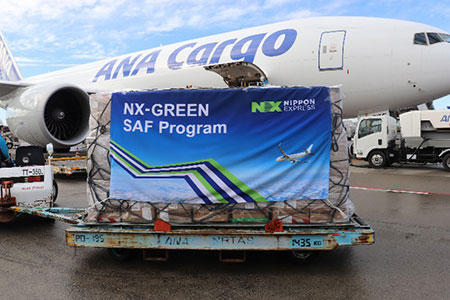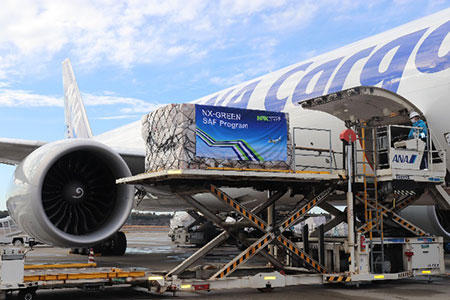Nippon Express Co., Ltd. (President: Shinjiro Takezoe; hereinafter "Nippon Express"), a group company of NIPPON EXPRESS HOLDINGS, INC. (President: Satoshi Horikiri), has concluded a basic transaction agreement with Honda Motor Co., Ltd. (hereinafter "Honda") enabling Honda to participate as a shipper in the Tokyo Metropolitan Government's project to promote SAF use.


Nippon Express has been selected as a designated cargo agent for the "Project to Promote SAF Use*1 in Air Cargo Transport for Corporate Compliance with Scope 3 Requirements*2" being implemented by the Tokyo Metropolitan Government since last August, and in that capacity it has been working to encourage the use of SAF. With Honda choosing to participate in this project as a shipper, Nippon Express and Honda signed a basic transaction agreement valid through January 31, 2025 under which Nippon Express will issue Honda a CO2 reduction certificate for its SAF usage as certified by a third-party organization and engage in other activities to cut Honda's Scope 3 CO2 emissions. Nippon Express will continue providing air cargo transport-related support to Honda's environmental initiatives as that company continues to grow globally.
The NX Group has positioned expanded SAF use as one of its initiatives to "develop and strengthen sustainable solutions," a material issue for the Group, and it has been providing customers with the "NX-GREEN SAF Program" as well as participating in the "SAF Flight Initiative" offered by ANA.
In tackling climate change, the NX Group aims to reduce in-house emissions Group-wide (Scope 1, 2) by 50% from 2013 levels by 2030, and in May 2023 submitted a letter of commitment to obtain certification under the Science Based Targets initiative (SBTi). Its goal is to help bring about carbon-neutral societies by 2050 (Scope 1, 2, 3). Going forward, the Group will continue sharing its stances on environmental conservation with its stakeholders and pursue efforts focused on material issues to achieve the NX Group Sustainability Vision.
[Related releases]
*1 A project whereby the Tokyo Metropolitan Government is assisting companies in covering the cost of using SAF for air cargo transport by shippers via designated cargo agents with the aim of helping these companies reduce CO2 emissions across their entire supply chains. Subsidies will cover the additional costs of using SAF for air cargo transport via freight forwarders selected to take part in the project until the end of March 2025.
*2 The GHG Protocol, an international standard jointly developed by the World Resources Institute (WRI) and the World Business Council for Sustainable Development (WBCSD), classifies a company's CO2 emissions into three categories.
Scope 1: Direct CO2 emissions from the company's business activities
Scope 2: The company's CO2 emissions from electricity consumption and other heat/power sources, etc., supplied by other companies
Scope 3: Indirect CO2 emissions from the company's business activities (product transport, employee commuting, business trips, etc.)